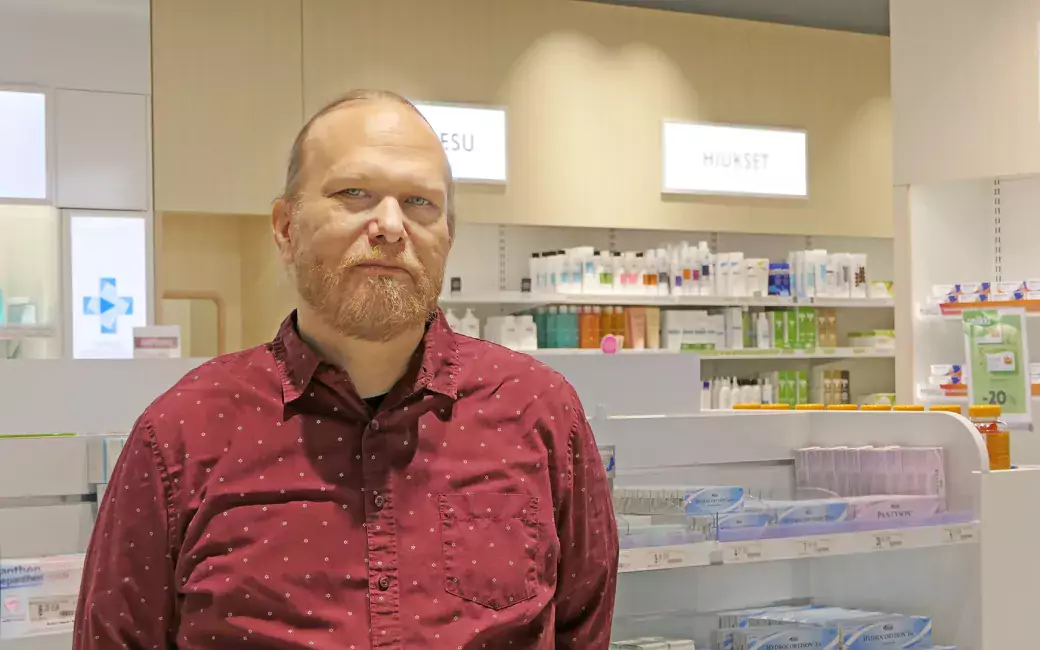Drug shortages have become more frequent in recent years. Doctoral Researcher Reko Ravela wants to stop blaming China and India and turn the attention towards the European supply chain.

Recently, there have been major problems with the availability of drugs. Last year, a record number of over 2,300 shortages were reported in Finland. At the moment, the situation in the case of clonazepam, which is used for severe epileptic seizures, has escalated to the point that the most that can be purchased at once corresponds, following restriction, to three months' consumption.
Shortages have been blamed, for example, on China and India, who produce the raw materials for the drugs. Doctoral Researcher Reko Ravela from the Faculty of Pharmacy disagrees.
"There is no research-based evidence that the disruptions are caused by these countries. I think they are used as scapegoats for the rest of the supply chain. And you can't blame the coronavirus pandemic either, as in the year before that shortages were almost at the same level as today. In fact, no detailed information on supply chains is available," says Ravela, who has investigated the drug shortage registers in Finland, Sweden, Norway, Spain and the United States.
Particular attention should be paid to the availability of generic drugs
According to Ravela, most of the shortages occurring in Europe likely have a European cause. In other words, they are more a result of regional pharmaceutical operations than they are attributable to non-European producers of raw materials.
Shortages are most common among generic drugs, whose share of the drug market is constantly growing. Generic drugs are those developed and introduced to the market after the patent protection of the original product expires, which makes it possible for them to have several manufacturers.
"It's less profitable for pharmaceutical companies to invest in their availability than in that of drugs remaining under patent protection and which generate more money for the company. And with several operators on the market, liabilities are a little unclear. With cost-effectiveness emphasised in generic drug production, the security of supply has become a secondary factor."
According to Ravela, shortage issues are not solely caused by the poor profitability of generic drugs under competitive conditions. There have been problems also with a generic drug manufactured by a single company without competition on the market.
Availability varies between countries
However, drug shortages do not affect all countries in the same way or at the same time, even in the context of Europe. One reason for this is that drugs cannot simply be sent where there is a lack of them. The information on the packaging must be presented in the languages of the country in question.
Availability is furthermore affected by the diversity of the global pharmaceutical market and the resulting economic aspect. A better price for certain types of drugs in a specific location also boosts their availability there.
"In Europe, shortages have predominantly been associated with outpatient drugs, which are purchased through pharmacies. In the Unites States, such drugs are usually several times more expensive than in Europe."
Delayed shortage reports particularly harmful to smaller user groups
According to EU legislation, drug manufacturers must anticipate and report shortages with at least two months' warning. And yet, Reko Ravela's research indicates that only a small share of notifications were submitted within the time limit, and as much as a third after the fact.
Late notifications can cause major problems for drug users.
"In Finland, the availability of the most important drugs is ensured through mandatory reserve medical supplies at wholesale operators and pharmacies. For example, there can be six or seven suppliers for basic hypertension drugs, as the market is so large. Problems arise in the case of drugs that are outside the mandatory reserve legislation and that have few suppliers."
Shortage registers are country-specific and maintained in each country's own systems, with no success in establishing a single European shortage database. Moreover, not all countries' registers are public, despite the original aim.
Unnecessary risks, effort, and rising costs
In addition to health-related risks, drug shortages increase costs and workloads at many levels.
If a drug prescribed by a doctor is unavailable at the pharmacy, the staff will look for a substitute. If no substitute is available, the customer must return to the doctor to obtain a different prescription.
Drug shortages in hospitals can result in longer hospital stays or delay critical treatment.
"And if a substitute for the missing drug is found, it may be more expensive or less effective, or it may cause more adverse effects in the patient."
Regulation and sanctions needed
In principle, the European Union obliges pharmaceutical companies to ensure the market availability of drugs. Yet as legislation does not elaborate on this obligation, in practice no sanctions (fines) are imposed either.
"Drug companies should be given clear incentives to maintain drug availability. This can be achieved through rewards or sanctions. From an economic point of view, fines constitute an operational risk for pharmaceutical companies that could potentially slightly increase the prices of generic drugs. I nonetheless think imposing sanctions would be the most effective way to address this."
Ravela points out that the availability of drugs without disruptions is one of the quality factors of drugs.
"Several other drug quality factors are strictly regulated, including the absence of impurities in drugs. The availability of drugs is a quality factor that has not been regulated at all in practice."
However, regulating transnational pharmaceutical companies on the national level is challenging.
"It would be desirable to provide solutions at the EU level."






